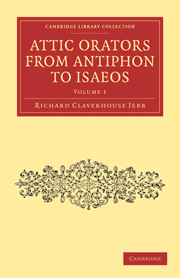Book contents
- Frontmatter
- PREFACE
- EDITIONS AND AUTHORITIES
- Contents
- CORRIGENDA
- ANNALS
- INTRODUCTION
- CHAPTER I ANTIPHON.—LIFE
- CHAPTER II ANTIPHON.—STYLE
- CHAPTER III ANTIPHON.—WORKS
- CHAPTER IV ANDOKIDES.—LIFE
- CHAPTER V ANDOKIDES.—STYLE
- CHAPTER VI ANDOKIDES.—WORKS
- CHAPTER VII LYSIAS.—LIFE
- CHAPTER VIII LYSIAS.—STYLE
- CHAPTER IX LYSIAS.—WORKS
- CHAPTER X LYSIAS.—WORKS
- CHAPTER XI LYSIAS.—WORKS
CHAPTER III - ANTIPHON.—WORKS
Published online by Cambridge University Press: 05 October 2010
- Frontmatter
- PREFACE
- EDITIONS AND AUTHORITIES
- Contents
- CORRIGENDA
- ANNALS
- INTRODUCTION
- CHAPTER I ANTIPHON.—LIFE
- CHAPTER II ANTIPHON.—STYLE
- CHAPTER III ANTIPHON.—WORKS
- CHAPTER IV ANDOKIDES.—LIFE
- CHAPTER V ANDOKIDES.—STYLE
- CHAPTER VI ANDOKIDES.—WORKS
- CHAPTER VII LYSIAS.—LIFE
- CHAPTER VIII LYSIAS.—STYLE
- CHAPTER IX LYSIAS.—WORKS
- CHAPTER X LYSIAS.—WORKS
- CHAPTER XI LYSIAS.—WORKS
Summary
The ϕονικοὶ λόγοι alone extant
Sixty speeches ascribed to Antiphon were known in the reign of Augustus; but of these Caecilius pronounced twenty-five spurious. Fifteen, including the twelve speeches of the Tetralogies, are now extant. All these relate to causes of homicide. The titles of lost speeches prove that Antiphon's activity was not confined to this province; but it was in this province that he excelled; and as the orations of Isaeos are now represented by one class only, the κληρικοί, so the orations of Antiphon are represented by one class only, the ϕονικοί.
The Tetralogies
The Tetralogies have this special interest, that they represent rhetoric in its transition from the technical to the practical stage, from the schools to the law-courts and the ekklesia. Antiphon stood between the sophists who preceded and the orators who followed him as the first Athenian who was at once a theorist of rhetoric and a master of practical eloquence. The Tetralogies hold a corresponding place between merely ornamental exercises and- real orations. Each of them forms a set of four speeches, supposed to be spoken in a trial for homicide. The accuser states his charge, and the defendant replies; the accuser then speaks again, and the defendant follows with a second reply. The imaginary case is in each instance sketched as lightly as possible; details are dispensed with; only the essential framework for discussion is supplied.
- Type
- Chapter
- Information
- Attic Orators from Antiphon to Isaeos , pp. 45 - 70Publisher: Cambridge University PressPrint publication year: 2010



